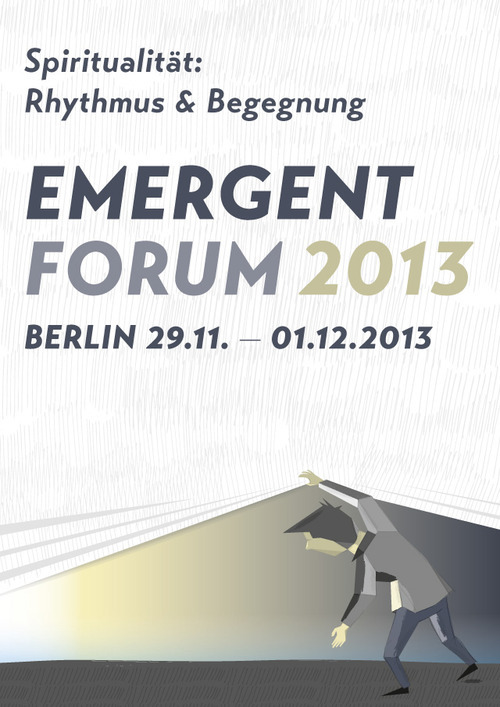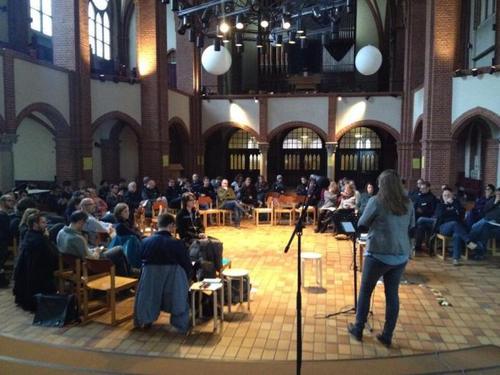Emerging conversations
Respectful conversations
In may 2013 Harold Heie, Senior Fellow of the Colossian Forum (TCF) and Rob Barrett, TCF Director of Fellows and Forums launched an online project called “respectful conversations.”
They felt the urge to initiate conversations. It was their goal to take immediate steps to encourage and help facilitate forums for respectful conversation regarding important contemporary issues. This conversation was designed to host heterogeneous opinions in an communicative surrounding. And despite the contrasting opinions, the idea was to originate “respectful conversations” as a way to engage those disagreeing.
Respectful conversations project is designed on three levels: providing resources, initiate conversations online as well as lectures and consultations.
The main focus of those conversations dealt around topics about future expressions of Evangelicalism in America. The conversation just started, but the themes the project already focused on were:
- Evangelicalism and the Broader Christian Tradition
- Evangelicalism and the Exclusivity of Christianity
- Evangelicalism and the Modern Study of Scripture
- Evangelicalism and Morality
- Evangelicalism and Politics
- Evangelicalism and Scientific Models of Humanity and Cosmic and Human Origins
- Evangelicalism and Higher Education
- The Future of American Evangelicalism
Starting in may 2013, every month a new topic, symbolized by a new “chapter” was put online. So called “primary contributors” launched the “respectful conversations” and also provided “leading questions” for readers to interact and comment on.
In a inner-denominational setting (and even more in a ecumenical setting) respectful conversations around hot potatoes of main theological questions are pretty rare.

Emerging conversation
A setting in which I experienced healthy, respectful and enlightening conversations in a ecumenical horizon was the emerging church movement.
Searching for new ways to live Christian fellowship and community and also yearning for multi-denominational inspirations, I joined Emergent-Deutschland (the German branch of the Emerging church movement) some years ago. I read the books and blogs, started blogging myself, went to barcamps and forums.
Apart from the inspirations, I was yearning for, I got something even more valuable, that I wasn’t expecting: a desire to provide save places to communicate, to get to know others and their (faith) backgrounds and to discuss hot potatoes.
Communication is one of the essential basics of the emerging church movement. And through discussions with others I did not only learn new perspectives provided by others, but also I clarified my own profile.

Emergent Forum
Each year Emergent Deutschland hosts a small interactive conference called the Emergent Forum. This year, the title was: “Spirituality: Rhythm and encounter.”
Heterogeneity is one of the main pillars engaging with the topics, the organization committee chooses. Attendants of the forum are aged 20-65 years old. Male and female. Lutheran, Reformed, Evangelical, Catholic, Baptist Independent, Non-denominational and many backgrounds more. Ordained and lay.
The forum usually includes a service or devotional time, inputs, workshops, interactive panels and a lot of time to communicate while a cup of coffee, a beer or a nice dinner.
Apart from the conversations during the forum, the emerging forum also stimulates a process of further online discussion. Most of the speakers of inputs and workshops also provided their material after the forum online to enable a further local conversation in the contexts and settings of the attendants. Resources, pictures, music, media, retrospect’s and reviews are supplied online.
Spirituality of balance
I was honored to be asked as the main speaker and to hold on input lecture on “spirituality”. (It can be reached here: Spiritualität ist Balance in Bewegung, in German though).
Arranging the lecture, I was really challenged to provide plural approaches on the topic of spirituality. During the discussion after my lecture I could sense the heterogeneity of the audience in their questions during the communication process. For the lecture and the following discussion I tried to foster a respectful conversation atmosphere.
My aspired attitude to welcome all opinions and to open save space to communicate are quite similar to those, Harold and Rob Barrett use as “ideals” for their project “respectful conversations”:
- I will try to listen well, providing each person with a welcoming space to express her perspective on the issue at hand
- I will seek to empathetically understand the reasons another person has for her perspective
- I will express my perspective, and my reasons for holding that perspective, with commitment and conviction, but with a non-coercive style that invites conversation with a person who disagrees with me
- In my conversation with a person who disagrees with me, I will explore whether we can find some common ground that can further the conversation. But, if we cannot find common ground, I will conclude that “we can only agree to disagree;” yet I will do so in a way that demonstrates respect for the other and concern for her well-being and does not foreclose the possibility of future conversations.
- In aspiring to these ideals for conversation, I will also aspire to be characterized by humility, courage, patience and love
What ideals would you mention as main principles to foster respectful conversations in your ministry context?
One response to “Emerging conversations”
Leave a Reply
You must be logged in to post a comment.
I will try to listen well, providing each person with a welcoming space to express her perspective on the issue at hand